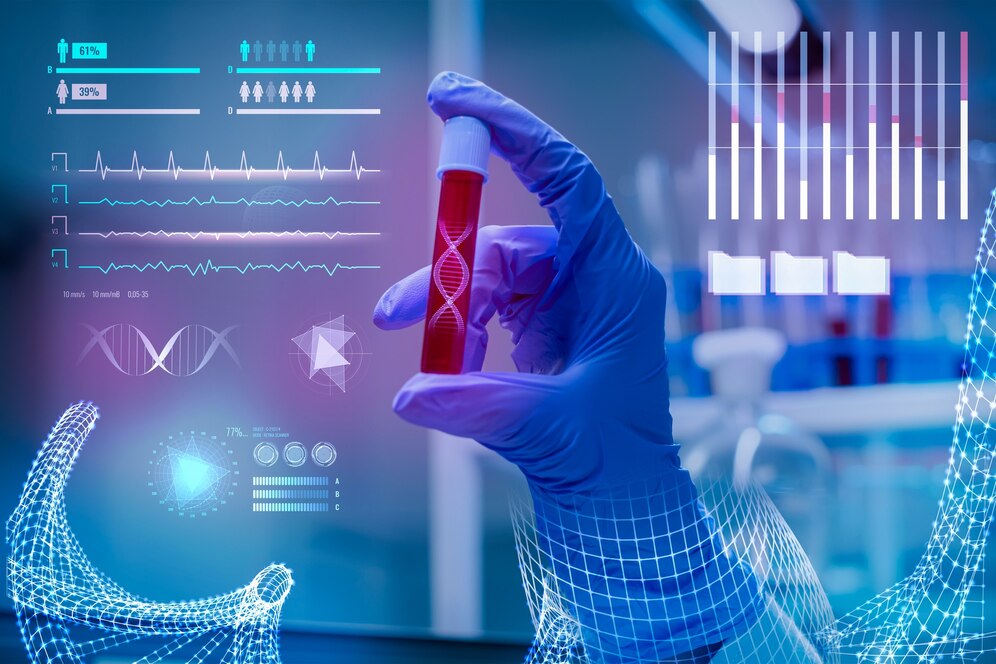AI transforms healthcare with data analysis, modeling, and automation for better patient care and operational efficiency. This blog explores AI's applications in intelligent diagnostics, personalized treatment, and predictive analytics.
Discover how AI empowers healthcare professionals and optimizes workflows, improving patient outcomes. Join us to explore the fascinating world of AI in healthcare, unlocking innovation and efficient healthcare delivery. Get ready for the future powered by Artificial Intelligence.

Moreover, tracking KPIs for RCM Healthcare Operations is crucial for optimizing revenue cycle management. Monitor key metrics like claim denial rates and days in AR to improve healthcare operations.
AI is used in healthcare to enhance patient care, improve operational efficiency, and drive better health outcomes. AI algorithms analyze data, identifying patterns, detecting diseases early, and personalizing your treatment plans.
Here are key facts behind using AI in the healthcare industry:
AI analyzes medical images accurately, aiding in early disease detection and precise diagnoses for you. This leads to timely interventions, improved treatment outcomes, and reduced healthcare costs. AI diagnostics empower you to make informed decisions for better patient care.
AI algorithms process your patient data, electronic health records, and medical images, spotting patterns and anomalies that may be overlooked. In addition, AI-driven diagnostics integrate diverse data sources, providing holistic insights into your health condition for comprehensive and personalized care.
AI analyzes your patient data, genetics, and medical history to create personalized treatment plans. This ensures therapies are tailored to you, minimizing adverse effects and optimizing efficacy. AI algorithms customize treatments based on your unique characteristics for improved outcomes.
Genetic profiling, clinical data analysis, and predictive models enable personalized interventions. These approaches enhance patient response rates and reduce adverse effects.
AI employs predictive models to forecast disease risks for you, enabling proactive interventions and preventive care. This approach helps identify individuals at high risk, facilitating targeted interventions to improve your health outcomes. AI analytics optimize resource allocation and streamline operations for a more efficient healthcare system.
AI predicts disease risks, empowering your healthcare providers to take preventive measures and interventions. By analyzing large datasets, AI identifies risk factors and early warning signs, allowing for targeted interventions to be implemented.
AI automates administrative tasks for you, streamlining workflows and optimizing resource allocation. This reduces operational burdens, enhances efficiency, and ultimately improves your patient care experience. With AI systems in place, your healthcare professionals have more time to focus on you and your needs.
AI automates tasks like scheduling, billing, and documentation, improving productivity and reducing errors. By streamlining operations, AI enhances healthcare efficiency and reduces administrative burden.
AI-powered devices enable you to benefit from remote patient monitoring and telehealth services, improving your access to healthcare. This enhances convenience by reducing the need for in-person visits and increasing patient satisfaction. AI facilitates real-time collection of your health data, enabling remote assessments for prompt and effective care.
AI-based remote monitoring collects vital data for real-time analysis, enabling healthcare providers to assess your health remotely. Telehealth platforms supported by AI enable virtual consultations and remote management of your treatment. These advancements greatly improve access to healthcare, particularly for individuals residing in remote areas or those with limited mobility.
AI aids you by analyzing large healthcare datasets, expediting research and drug discovery. AI algorithms identify patterns, trends, and correlations, guiding researchers in developing innovative treatments and therapies. With AI, the research and development processes are accelerated.
AI algorithms identify potential drug targets, optimize trial design, and expedite the discovery of new treatments. AI-driven drug development reduces your time and costs, benefiting patients and medical science.
AI can be utilized in healthcare through various applications, leading to improved patient care and operational efficiency. Here are the key ways to use AI in healthcare:
AI algorithms analyze medical images to aid you in accurate diagnosis and early disease detection. These machine learning models assist radiologists like you by identifying patterns and anomalies, enhancing diagnostic accuracy. With AI-powered image recognition technologies, precise interpretation is enabled, leading to improved patient outcomes.
Computer-aided diagnosis systems support clinicians in identifying abnormalities, reducing the occurrence of false positives and negatives. Through continuous learning from data, AI algorithms can refine their diagnostic capabilities over time, further improving accuracy.
AI analyzes your patient data, medical history, and genetics to develop tailored treatment plans for you. Machine learning algorithms predict the optimal drug responses based on your individual characteristics, leading to improved therapeutic outcomes. Precision medicine, driven by AI, enhances targeted therapies to provide better care for you.
By combining genetic profiling with AI, personalized interventions and risk assessment can be achieved. AI algorithms continuously monitor your treatment responses and adjust therapy plans accordingly to meet your evolving needs.
AI utilizes predictive analytics to forecast disease risks and health outcomes for you. Machine learning models identify early warning signs, enabling proactive interventions to prevent diseases. AI algorithms analyze your patient data, identifying early signs of deterioration and facilitating timely interventions when needed.
Predictive models optimize resource allocation, streamlining healthcare operations and improving patient flow. AI-powered risk stratification tools aid in identifying high-risk patients like you, allowing for targeted preventive measures and interventions.
AI-based virtual assistants are here to provide you with personalized patient support, answering your healthcare-related queries promptly. Chatbots offer real-time assistance, triaging your symptoms and providing basic medical advice when needed. Voice-enabled virtual assistants can schedule appointments for you, facilitate medication reminders, and offer patient education.
AI-driven chatbots play a crucial role in improving patient engagement and empowering you in self-care management. Through Natural Language Processing (NLP), chatbots can accurately understand and respond to your inquiries, ensuring effective communication.
AI-powered robotic systems are designed to assist you, the surgeon, in performing complex surgeries with precision and minimal invasiveness. These robotic assistants enhance your dexterity, reduce patient recovery times, and improve overall surgical outcomes.
Robotic surgical assistants offer steady hands and increased control, especially during delicate procedures where precision is crucial. AI-driven robotics also enable telesurgery, allowing remote surgeons to perform procedures globally, expanding access to specialized surgical care.
AI algorithms analyze vast healthcare datasets, helping you identify patterns, trends, and valuable insights for improved patient care. Machine learning models uncover hidden correlations that aid in medical research and discovery. With AI, drug discovery is accelerated by analyzing genomic and chemical data, expediting the identification of potential candidates.
Data mining and AI algorithms play a crucial role in identifying population health trends, enabling you to implement targeted public health interventions. AI-powered data analysis enhances clinical trial design, improves patient recruitment, and increases overall trial success rates.
AI is a game-changer in healthcare, revolutionizing patient care and operational efficiency. CloudRCM, a trusted provider in the industry, offers advanced AI solutions to optimize medical billing processes. With our expertise in AI-powered medical billing, we ensure accurate coding, streamlined workflows, improved reimbursement, and enhanced patient outcomes.
Choose CloudRCM today to harness the power of AI and elevate your healthcare practice to new heights.
Incorporating AI into healthcare can benefit you in various ways. AI algorithms can analyze medical data and images, assisting in accurate diagnoses and early disease detection. Additionally, AI streamlines administrative tasks, saving time and improving operational efficiency.
By utilizing AI in healthcare, you can experience numerous benefits. AI improves diagnostic accuracy, leading to earlier treatment interventions and better patient outcomes. It also automates administrative tasks, reducing paperwork and freeing up time for healthcare professionals to focus on patient care.
AI algorithms are designed to enhance diagnostics and medical imaging for your benefit. They analyze medical images with precision, helping to identify abnormalities and diseases that may go unnoticed. This results in more accurate diagnoses, timely treatments, and improved overall healthcare outcomes.
AI can streamline healthcare operations to optimize efficiency for you and the healthcare system. It automates administrative tasks such as scheduling and billing, reducing manual efforts and potential errors. This allows healthcare providers to allocate more time to patient care, enhancing the overall healthcare experience.
Absolutely! AI can play a significant role in remote patient monitoring, benefiting you by providing convenient and timely healthcare services. AI-powered devices and systems collect and analyze your health data remotely, enabling healthcare providers to monitor your vital signs and track changes in your health condition, ensuring proactive care and timely interventions.
AI plays a pivotal role in personalized medicine, tailoring treatment plans specifically for you. By analyzing your individual data, such as genetics, medical history, and lifestyle factors, AI can help healthcare providers create personalized treatment approaches that optimize effectiveness and minimize adverse effects, ensuring the best possible outcomes for you.
Ensuring the security and compliance of AI in healthcare is of utmost importance. Healthcare organizations implement robust security measures to protect your confidential data and adhere to privacy regulations. AI algorithms and systems are developed with ethical considerations and industry standards to maintain privacy and security.

Revenue Cycle Management (RCM), the method for handling healthcare claims adjudication, is the revenue generator for